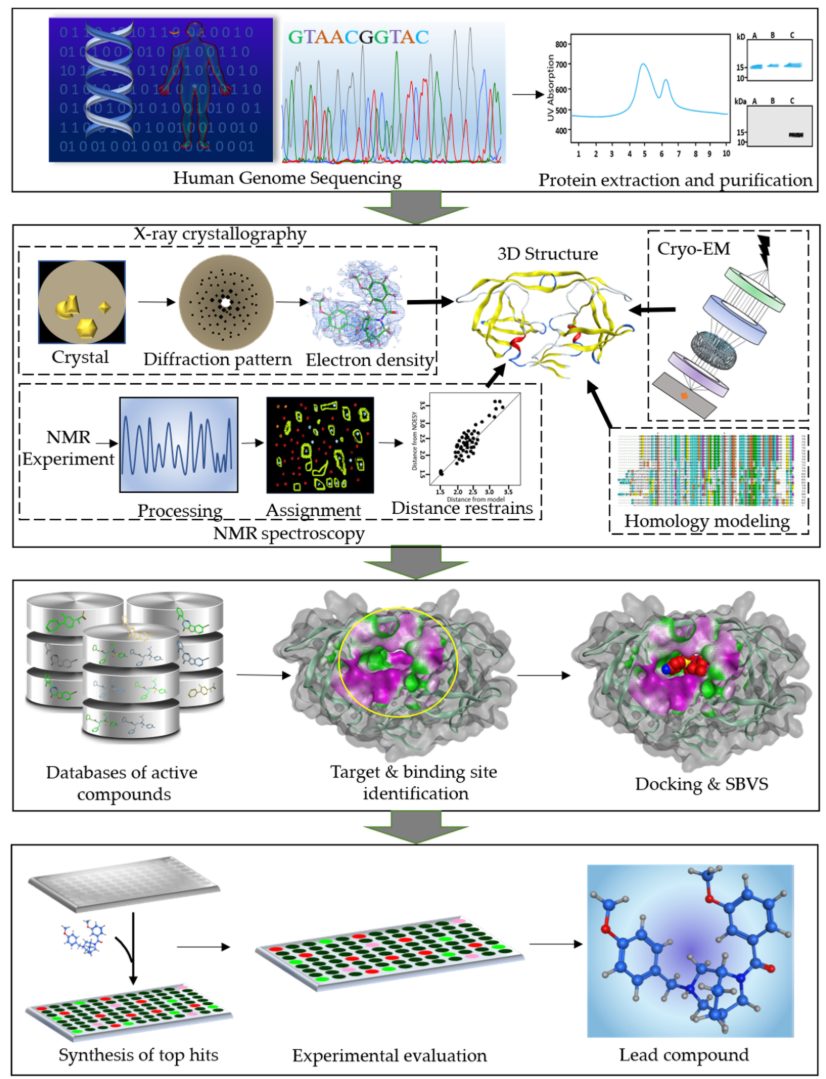Structure Based Drug Discovery Services
Structure-Based Drug Discovery (SBDD) enables a rational and efficient approach to drug development by utilizing the three-dimensional structure of target proteins to guide compound design. The structure-based drug discovery strategy enables precise identification of binding sites, significantly reduces unnecessary compound synthesis and experimental trial-and-error, thereby lowering costs and accelerating project timelines. MtoZ Biolabs provides comprehensive Structure Based Drug Discovery Services that integrate high-resolution structural biology, fragment screening, computational modeling, and medicinal chemistry. Our Structure Based Drug Discovery Services are designed to help clients efficiently translate structural information into potent, selective, and developable drug candidates.
Analysis Workflow
1. Target Identification and Protein Preparation
The process of Structure Based Drug Discovery Services starts with identifying disease-relevant targets through genomic or proteomic analysis. Once selected, the target protein is expressed and purified to ensure quality and suitability for structural studies.
2. Structure Determination
To guide structure-based design, the 3D structure of the target protein is resolved using suitable techniques such as X-ray Crystallography, Cryo-Electron Microscopy (Cryo-EM), or Nuclear Magnetic Resonance (NMR), depending on the protein’s characteristics. If experimental data are unavailable, homology modeling can be used to generate structure predictions based on known protein templates.
3. Binding Site Identification and Analysis
Once the 3D structure is resolved, computational tools are used to analyze the surface topology, electrostatic potential, and hydrophobic pockets to locate potential ligand-binding sites. These sites are evaluated for druggability using pocket depth, volume, and residue composition.
4. Virtual Screening and Molecular Docking
Once the binding site is defined, databases of known bioactive compounds or fragment libraries are computationally screened. Selected compounds are docked into the binding cavity of the target protein using molecular docking algorithms to predict binding modes and rank them based on affinity scores.
5. Hit Synthesis and Optimization
Top-scoring compounds from virtual screening are synthesized de novo. Medicinal chemists may introduce modifications to improve binding affinity, solubility, or synthetic accessibility. Fragment-based strategies such as growing, linking, or merging may also be applied when working with fragment hits.
6. Experimental Validation
The synthesized compounds are evaluated using a panel of biophysical and biochemical assays. Techniques such as Surface Plasmon Resonance (SPR), Isothermal Titration Calorimetry (ITC), and Differential Scanning Fluorimetry (DSF) are used to confirm direct binding, measure binding kinetics, and determine thermal shifts.
7. Lead Compounds Identification
Based on structural data, binding performance, and biological activity, high-quality compounds with optimal pharmacological profiles are selected as leads.

Figure 1. A Workflow Diagram of Structure-Based Drug Discovery Process
Service Advantages
☑️Integrated Drug Design Workflow: From target validation to lead optimization, our seamless workflow integrates structural biology, medicinal chemistry, and computational tools to accelerate candidate selection.
☑️High-Resolution Structural Analysis: We utilize cutting-edge platforms such as X-ray crystallography, Cryo-EM, and NMR to provide atomic-level insight into target-ligand interactions, enabling precise structure-guided design.
☑️Efficient Computational Screening: Our advanced molecular modeling and docking pipelines support high-throughput virtual screening, reducing time and cost while enhancing hit quality.
☑️Experienced Scientific Team: Our multidisciplinary team has extensive experience in protein structure analysis, binding site evaluation, and rational ligand design across diverse therapeutic areas.
Deliverables
1. Comprehensive experimental details
2. High-resolution structural data (X-ray, NMR, or Cryo-EM)
3. Binding site analysis and druggability assessment
4. Virtual screening results with ranked hit compounds
5. Detailed synthetic pathway for hits
6. Other detailed information of structure-based drug discovery
For more information about our Structure Based Drug Discovery Services, please contact us.
Related Services
High Throughput Drug Discovery Service
Hit Identification Service | Drug Discovery
How to order?







